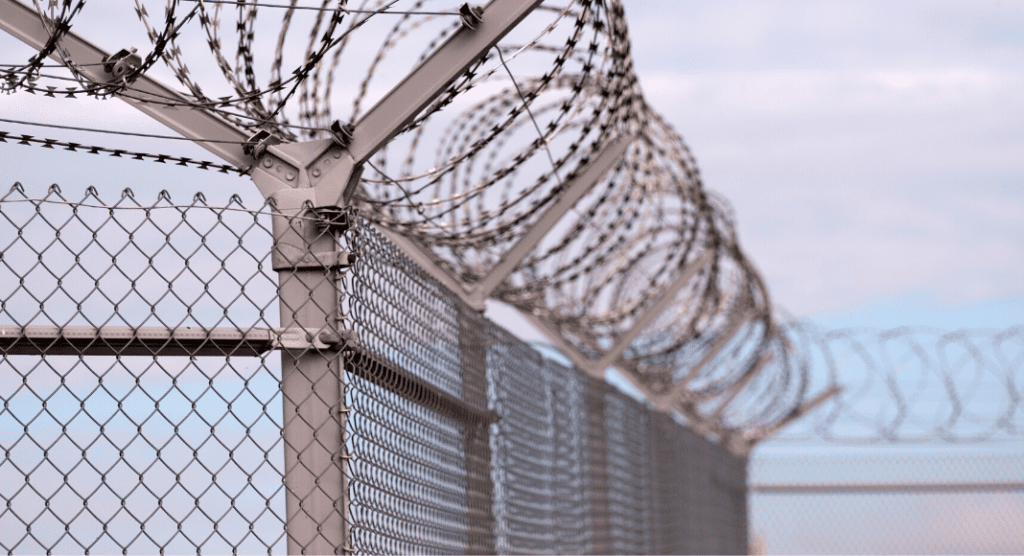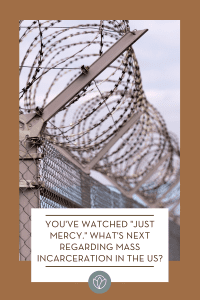In response to current events, Warner Bros. has been offering free streaming rentals for its film Just Mercy during the month of June. If you haven’t watched it yet, it’s free for a few more days. It’s well worth your time.
Just Mercy is a film based on the life work of civil rights attorney Bryan Stevenson who defends individuals on death row wrongly condemned or who were not afforded proper representation.
This film is an excellent introduction to the criminal justice reform necessary in our country. But it only scratches the surface of what there is to know about the problem.

Did you know crime rates in the U.S. have gone down, but our incarceration rates are the highest in the world? Mass incarceration is not occurring because of an increase in crime, but because of policy changes and court orders regarding prison sentences.
There are 2.2 million human beings in United States’ prisons. In fact, there’s been a 500% increase in the prison population in the last 40 years.
How did this happen? The era of the “war on drugs” and getting “tough on crime” resulted in a number of policies that required harsher and longer sentences with mandatory minimums. According to the Sentencing Project, 50% of people in prison or jail today are there because of drug offenses.
And of course, the racial impact of mass incarceration is not proportional. While people of color make up 37% of our country’s population, they make up 67% of the prison population (Sentencing Project).
Implicit bias and socioeconomic inequality contribute to racial disparities in the criminal justice system. In fact, wealth (not necessarily culpability) determines outcomes for many convicted of crimes. Many people charged with crimes lack the resources to obtain the help they need resulting in wrongful convictions and excessive sentencing.
Perhaps, you are thinking, “But don’t we want our streets and our cities to be safe?” Yes, of course! But is mass incarceration actually making them safer?
According to research, no. Greater incarceration and harsher sentences do not reduce crime. Using prisons to deal with mental illness and poverty (and even substance abuse) exacerbate those problems and solve nothing.
If you truly care about human life and human dignity, this issue deserves your attention. So what do we do?
Particularly if you’re skeptical (I was too at first), dive into educating yourself about mass incarceration in our country. Below are a few resources.
WEBSITES
While I’m sure there are many other sites dedicated to fighting for justice in the criminal justice system, two I’ve found to be most helpful are the Equal Justice Initiative and The Sentencing Project.
DOCUMENTARIES
Check out the documentary 13TH on Netflix. This film explores the issue of race and the criminal justice system in America. The film’s title refers to 13th amendment, which freed slaves with the exception of criminals. The film makes the argument that incarceration in the U.S. is an extension of slavery.
PODCASTS
I love how both of these podcasts humanize the individuals who are incarcerated. Check out 70 Million (named for the 70 million Americans living with a criminal record) and Ear Hustle. People in prisons are not numbers. They are not their alleged crimes or even their actual crimes. They are humans with a story and a purpose. Once you hear from them, you can’t forget them.
BOOKS
The quintessential book on mass incarceration was actually written over 10 years ago. The New Jim Crow: Mass Incarceration in the Age of Colorblindness by Michelle Alexander challenges readers to place mass incarceration at the forefront of a new movement for racial justice in America. She’s written a new forward that addresses everything that’s happened in the past 10 years regarding this topic since this book has been published. It’s extremely well researched, but also engaging and easy to read. (I actually listened to this one on audio from the library.) There have been many other books published on the topic as well. But I have not read them yet.
A favorite book of mine doesn’t necessarily address this issue of mass incarceration head-on. But it was my introduction to realizing there was a problem with our criminal justice system. A Place To Stand is the memoir of New Mexican poet and writer Jimmy Santiago Baca. While serving a five-year sentence in a maximum-security prison, Baca learned to read and discovered his writing talent. He now runs Cedar Tree Inc, a non-profit that conducts literary workshops in prisons, detention centers, community centers, and schools for at-risk youth. Their mission is to offer under-served communities the tools to overcome obstacles to learning.
After educating yourself about mass incarceration, discover your next steps. If I’m honest, this is where I am right now in the process. I understand the problem and I want to be a part of reform. Here are a few suggestions.
CONTACT YOUR REPRESENTATIVES
Here are a few action items you can take to your government representatives. (You can even email them from that website. Easy peasy.)
DONATE
Both The Sentencing Project and The Equal Justice Initiative are 5013c non-profit organizations and rely on donations.
VOTE
Vote for representatives who care about the issues I care about.
This issue has seemingly nothing to do with parenting, moms, families, or Albuquerque specifically. Why am I writing about it on ABQ Mom? Parents, we have such a unique opportunity to shape the future with the little ones we’re raising. If we can educate ourselves and our kids, we affect change!
Pin this post on Pinterest.












